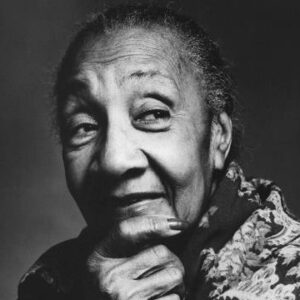Alberta Hunter was a well-known American blues singer, composer, and nurse. She surpassed many human feats and achievements during the course of her six-decade career. She began her singing career in a brothel in Chicago called Dago Frank’s. She eventually got the chance to play at the Dreamland Café, where she began to gain notoriety as a vocalist. She used to record songs under the aliases May Alix and Josephine Beatty in the beginning of her career. She has collaborated with notable jazz figures such as Louis Armstrong, Euble Blake, and others. Her performance in the 1935 British musical film “Radio Parade” is notable. She worked as a nurse after retiring from the music industry. In 2011, she was inducted into Blue’s Hall of Fame for her spectacular comeback in her eighties, demonstrating her class even after such a long absence. She worked on the song for the film “Remember My Name” and played at Barney Josephson’s club during her comeback. Aside from these, she continued to perform in a variety of clubs, concerts, recordings, and television shows. Her life is the subject of the documentary “Alberta Hunter: My Castle’s Rockin.”
Childhood and Adolescence
Alberta Hunter was born in Memphis, Tennessee, to Charles E. Hunter, a train porter. Her father abandoned the family after she was born. Her mother remarried after working as a domestic in a brothel.
She ran away to Chicago at the age of 11 and took a job in a boarding house for $6 a week. She would frequently sneak into numerous nightclubs at this time in order to perform as a vocalist.
Alberta Hunter’s Career
In 1911, she played at Dago Frank’s, a club on Chicago’s Southside. She quit the club after it closed after two years of employment. She began performing in the Elite Caf following that, when she met pianist and songwriter Tony Jackson.
She was instrumental in the success of Tony’s song Pretty Baby. She worked in many nightclubs for several years. Her performance in Dreamland Caf in 1917 established her as one of Chicago’s best blues singers.
She went to New York for a recording session with Black Swan Records. She recorded a number of songs in 1921, including “He’s a Darned Good Man to Have Around,” “How Long, Sweet Daddy, How Long,” and others.
She traveled between Chicago and New York for the next two years for her performances and recording job. She recorded a couple of songs for the Paramount label in July of 1922.
She had one of the most successful periods of her career in February 1923, when she became the first African American vocalist to be accompanied by an all-white band, the Original Memphis Five.
In the month of February, she recorded three songs with this band. “Ain’t Nobody’s Biz-ness If I Do” was one of them. In the same month, she also recorded 14 songs for Paramount Records with Fletcher Henderson’s Orchestra.
She moved to New York in 1923 with the intention of performing on Broadway. She joined the musical cast of “How Come?” and quickly gained recognition as a talented performer.
She continued to record for Paramount after that. She broke her contract with Paramount in 1924 by recording five songs under the name Josephine Beatty. She lost her contract at the end of the year as a result of this.
The Red Onion Jazz Babies afterward joined her on stage. She signed with Okeh Records in 1925 and remained with them until 1926. She recorded three songs for Vocalion, a Chicago record label, at the conclusion of this year.
She recorded a song for Victor in 1927. She collaborated with Victor on seven songs. “Beale Street Blues” was one of these recordings. She relocated to London in 1928 and played at the London Pavilion.
In May 1928, she played Queenie in the London theater production of the musical “Showboat.” Despite the fact that the play only lasted three months, she stayed in London until 1929.
She recorded 12 songs in London in 1934 and had them issued on the HMV label. Noel Coward wrote “I Travel Alone,” which is one of these songs. “The Legendary Alberta Hunter: The London Sessions-1934” was eventually released with these tunes.
She starred in the first color British film, Radio Parade, released in 1935. She returned to the United States in January 1935 and recorded four songs for the American Record Company. However, none of these records were ever published.
She was a regular on NBC radio from 1937 until 1938. She recorded four songs for Bluebird in 1940. She began recording songs after WWII through Juke Box (two tracks) and Stash (four songs) (one recording).
Personal History and Legacy
In January 1919, she met Willard Saxby Townsend and on January 27th, 1919, they married in Kentucky. Unfortunately, their union was never completed. In 1923, they divorced.
She identified as a lesbian. She used to live with Lottie Tyler, her partner. Tyler was Bert Williams’ niece, an African-American comedian. They were New York residents. They ended their relationship in Paris but remained close friends.
Estimated Net worth
Alberta is one of the wealthiest blues singers and one of the most popular. Alberta Hunter’s net worth is estimated to be $10 million, according to Wikipedia, Forbes, and Business Insider.
Trivia
In 1956, she earned her certificate as a licensed practical nurse after graduating from the Harlem YWCA nursing school. She retired in 1977 after more than two decades as a nurse.
She began performing as a cabaret singer in New York after her retirement at the Cookery in Greenwich Village, despite the fact that she was over 80 years old at the time.


